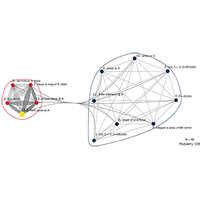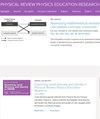Utilizing network analysis to explore student qualitative inferential reasoning chains
IF 3.6
2区 教育学
Q1 EDUCATION & EDUCATIONAL RESEARCH
Physical Review Physics Education Research
Pub Date : 2024-05-29
DOI:10.1103/physrevphyseducres.20.010147
引用次数: 0
Abstract
Over the course of the introductory calculus-based physics course, students are often expected to build conceptual understanding and develop and refine skills in problem solving and qualitative inferential reasoning. Many of the research-based materials developed over the past 30 years by the physics education research community use sequences of scaffolded questions to step students through a qualitative inferential reasoning chain. It is often tacitly assumed that, in addition to building conceptual understanding, such materials improve qualitative reasoning skills. However, clear documentation of the impact of such materials on qualitative reasoning skills is critical. New methodologies are needed to better study reasoning processes and to disentangle, to the extent possible, processes related to physics content from processes general to all human reasoning. As a result, we have employed network analysis methodologies to examine student responses to reasoning-related tasks in order to gain deeper insight into the nature of student reasoning in physics. In this paper, we show that network analysis metrics are both interpretable and valuable when applied to student reasoning data generated from reasoning chain construction tasks. We also demonstrate that documentation of improvements in the articulation of specific lines of reasoning can be obtained from a network analysis of responses to reasoning chain construction tasks.

利用网络分析探索学生定性推理链
在以微积分为基础的物理入门课程中,学生通常需要建立对概念的理解,并发展和完善解决问题和定性推理的技能。在过去的 30 年中,物理教育研究界开发了许多基于研究的教材,这些教材使用一系列支架式问题来引导学生进行定性推理。人们通常默认,除了培养概念理解能力,这些教材还能提高定性推理技能。然而,明确记录此类材料对定性推理技能的影响至关重要。我们需要新的方法来更好地研究推理过程,并尽可能地将与物理内容相关的过程与所有人类推理的一般过程区分开来。因此,我们采用了网络分析方法来研究学生对推理相关任务的反应,以便更深入地了解学生物理推理的本质。在本文中,我们展示了网络分析指标在应用于推理链构建任务生成的学生推理数据时,既可解释又有价值。我们还证明,通过对推理链构建任务的响应进行网络分析,可以获得在阐明特定推理思路方面有所改进的记录。
本文章由计算机程序翻译,如有差异,请以英文原文为准。
求助全文
约1分钟内获得全文
求助全文
来源期刊

Physical Review Physics Education Research
Social Sciences-Education
CiteScore
5.70
自引率
41.90%
发文量
84
审稿时长
32 weeks
期刊介绍:
PRPER covers all educational levels, from elementary through graduate education. All topics in experimental and theoretical physics education research are accepted, including, but not limited to:
Educational policy
Instructional strategies, and materials development
Research methodology
Epistemology, attitudes, and beliefs
Learning environment
Scientific reasoning and problem solving
Diversity and inclusion
Learning theory
Student participation
Faculty and teacher professional development
 求助内容:
求助内容: 应助结果提醒方式:
应助结果提醒方式:


